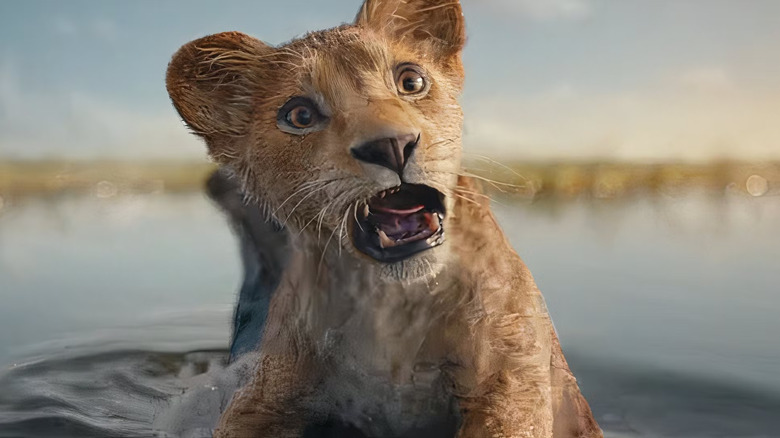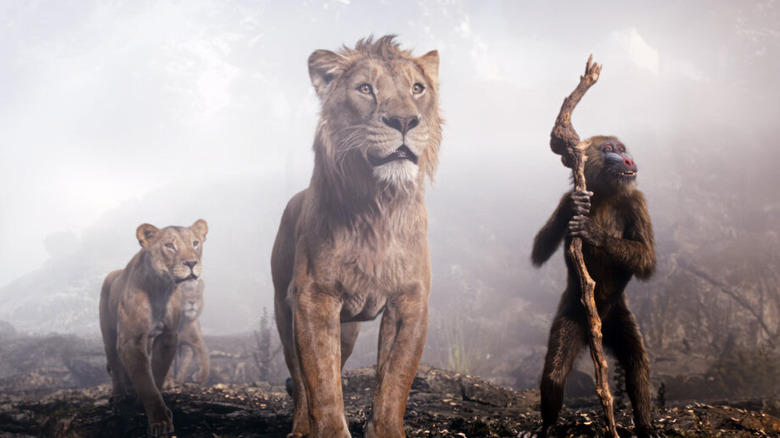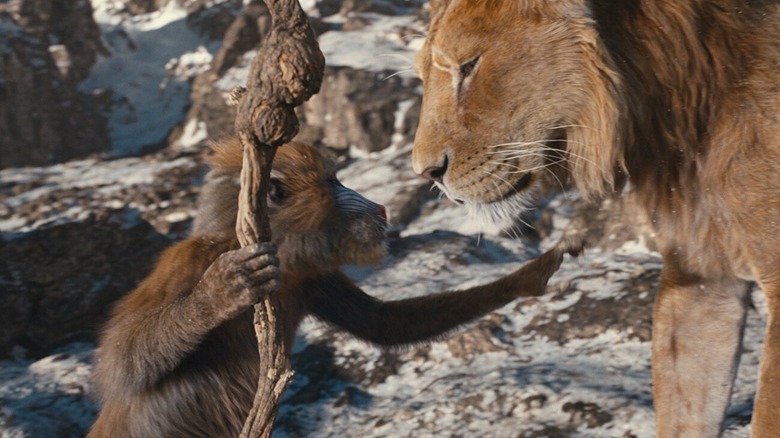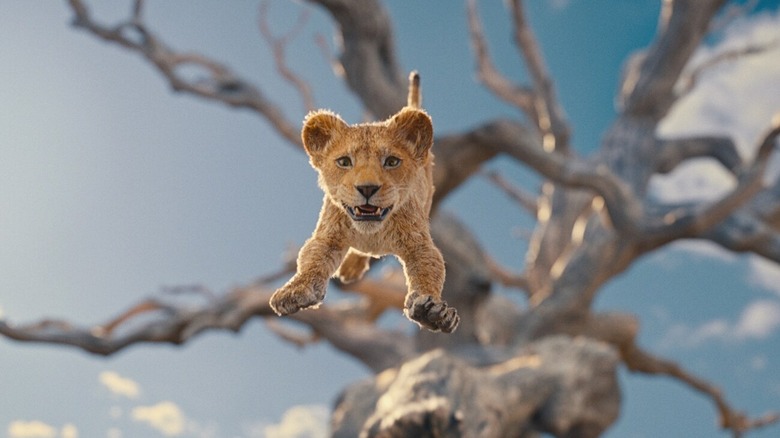Mufasa: The Lion King Review: An Improvement, But Never As Good As The Original Film
It's kind of wild that the explorative pop culture prequel is still a thing among Hollywood filmmakers. There has been a recent tendency to tell a very specific kind of origin story that meticulously catalogs how certain familiar commercial figures came into being. The goal of these stories is not to expand on a character's complexity, introduce a new mystery into their lives, or to critically re-litigate their function, but to aggressively reinforce the feelings audiences already have. Audiences have, to offer a metaphor, been addicted to the same pop culture drug for years, but repeated viewings and general commercial ubiquity has caused them to built up a tolerance. Hollywood has responded by essentially adding metaphorical cocaine to the drugs, hoping to offer the exact same high, but slightly altered.
The high is satisfying for fans, but rarely provides great new ideas. There have been several versions of this phenomenon in 2024. There was "Alien: Romulus," which offered the same monsters and even used CGI to resurrect a deceased actor. There was "The Lord of the Rings: The War of the Rohirrim," which taught us how Helm's Deep got its name. There was the actually-kinda-good "Transformers One," which explored how Optimus Prime first transformed. There was the legitimately scary "The First Omen." Even "Wicked" counts, although that's a pop phenom unto itself.
Now we have Barry Jenkins' "Mufasa: The Lion King," a prequel to Jon Favreau's 2019 digitally animated remake of 1994's "The Lion King." It's hardly the first "Lion King" prequel/interquel/spinoff — it comes after the 2004 straight-to-video movie "The Lion King 1½," 1998's "The Lion King II: Simba's Pride," and the 2005 TV series "The Lion Guard" — but Jenkins has once again pointed out: learning where pop icons came from isn't ever as interesting having them in the first place. Seeing how Mufasa from "The Lion King" grew up is little more than pop filler. It's a Silmarillion for Disney Adults. It's ultimately kind of useless.
Ever wanted to know where Rafiki got his stick?
Jenkins at least addresses of the central issues of Jon Favreau's "The Lion King," namely, that lions aren't very expressive animals. Favreau animated his 2019 film to look as photorealistic as possible, and he was largely successful, but the result left the animals' faces static and non-emotive. Jenkins gives his lions a little more facial texture in "Mufasa," and is clearly freer to stretch them a few hairs beyond what real-life lions can do, letting them actually convey facial emotions. There is still, however, a frustrating visual homogeneity throughout Jenkins' film, retaining an element of Favreau's general visual flatness. By the end of the film's 118 minutes, you'll get mighty sick of looking at the same CGI hair textures and grinding lion jaws. Your eye will strain at the same types of stone and dirt texture. You might even hate lions.
The central sin of "Mufasa," however, is its horrid pacing. The story is staged as a flashback, with the elderly mandrill Rafiki (John Kani) telling a story to the meerkat Timon (Billy Eichner), the warthog Pumbaa (Seth Rogen), and the lion cub Kiara (Blue Ivy Carter), the child of Simba (Donald Glover) and Nala (Beyoncé Knowles-Carter, who made her own semi-spinoff movie, if you'll recall) from the first movie. The two parent lions are away on important business during a storm, and Rafiki passes the time by telling the tale of Simba's dead father, Mufasa.
Mufasa's story is a broad epic that rushes as quickly as possible through all of its details. Mufasa (Braelyn Rankins as a cub, Aaron Pierre from "Rebel Ridge" as an adult) was born in a distant part of the country, and was told by his parents about the Circle of Life. He just can't wait to be king. A flood will separate him from his parents, however, before we really get to know them or what his life was like as a youngling.
The pace of Mufasa is way, way too fast
The swift, unexpected flood deposits Mufasa in front of Taka (Theo Somolu as a cub, Kelvin Harrison, Jr. as an adult), the prince of a separate pride. Taka's father Obasi (Lennie James) is full of fear, telling his son that lying is okay when the king does it, and that protecting pure bloodlines is key to retaining integrity. He's a bundle of dark, topical themes that all feel startlingly relevant. Taka, an innocent, merely wants to play with Mufasa, and enjoy the fact that he has a new adopted brother. No points for guessing that Taka will change his name by the end of the film.
Then, in a flash, Obasi's pride runs afoul of an even more villainous clan of all-white lions ruled over by Kiros (Mads Mikkelsen), upset that Mufasa killed his son (!). Kiros and his lions will break up the pride, and pursue Mufasa and Taka throughout the landscape as they flee to a magical paradise that they sense is just over the horizon. On their journey, they will accumulate a young Rafiki (Kagiso Lediga), a lioness named Sarabi (Tiffany Boone), and bird named Zazu (Preston Nyman). They will trek across plains and into the snowy mountains, talking, bickering, falling in love, developing resentments, and re-enacting the cliff-jumping scene from "Butch Cassidy and the Sundance Kid."
The story of "Mufasa" is a tale of bad parentage, the dangers of resentment, and how heroes and villains come to be, natch. The lessons one learns as a child can lead to poisoned adulthood or noble maturity. These are all fine, if predictable messages for an animated Disney flick.
The songs are good, though
But "Mufasa" becomes bored with itself along the way. The action frequently cuts back to Timon and Pumbaa to offering "comedic" color commentary that is not in the least bit funny. And given how haphazardly edited the film is already, the cutaways lend a dizzying element of narrative chaos that pushes audiences far out of the action. Jenkins seems to be grasping for a picaresque Odyssey, but he doesn't take any time to simply look around, pause for a breath, let audiences take in the grandeur. He seems to be telling the story as quickly as possible before he forgets it, like trying to recall a dream after you wake up. "Mufasa" is supposed to be a story of how the Lion King came to be, but it feels more like it's constantly dissipating.
Lin-Manuel Miranda provides new songs for Jenkins' film, and they are energized and hummable. I was particularly fond of Kiros' villain song "Bye Bye." In trying to recapture the magic of 1994's "Lion King" (with its Oscar-nominated songs by Elton John and Tim Rice), however, Miranda draws direct musical analogues. "Bye Bye" serves the same function, and comes in the same place in the narrative, as the original's "Be Prepared," for instance. Likewise, there are parallel songs to "I Just Can't Wait to Be King," "Hakuna Matata," and "Can You Feel the Love Tonight." Miranda is an amazing songwriter, and he has worked effectively with Disney on multiple occasions, but this is the first time he feels bound-in by the strictures of the prequel ethos; he is recreating more than he is creating.
"Mufasa" will satisfy, but it also feels ultimately useless. Like Disney is once again spinning its wheels, trying to wring billions of dollars out of old ideas while they brainstorm new ones. Fans of "The Lion King" may be slightly moved. At the very least, you'll finally know how Rafiki got his stick.
/Film rating: 5.5 out of 10
"Mufasa: The Lion King" opens in theaters on December 20, 2024.



